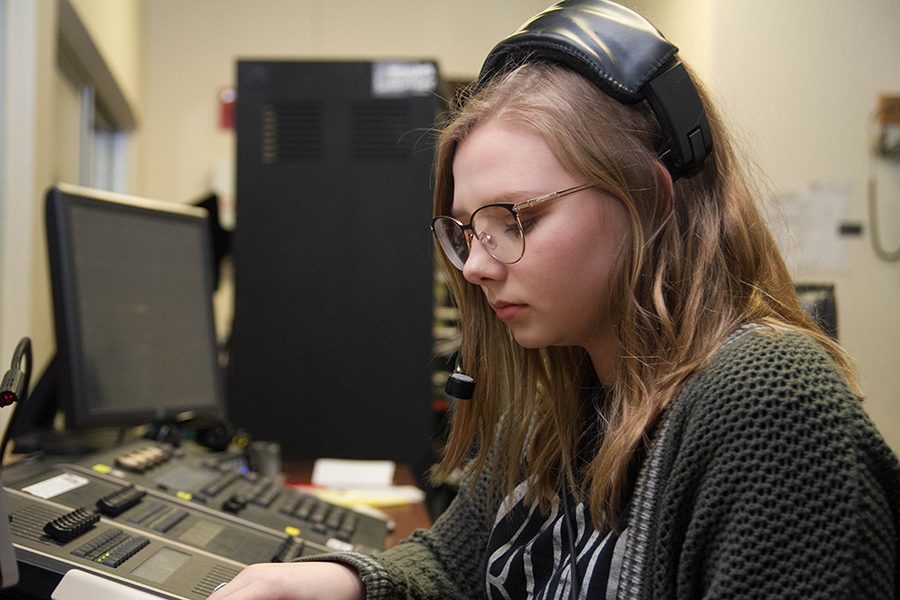It’s all theater
Sophomore finds passion in acting and stage management
Photo by Kaitlyn Gordon
October 19, 2017
To her, it doesn’t matter if she’s in a costume or a cardigan. To her, it doesn’t matter if she’s in the lights or working them. To her, wearing the microphones and putting them on are equally important. To her, behind the scenes or on the stage, it’s all theater.
Sophomore Shelby Steele has been involved in theater almost her entire life. She works in both the technical areas and in acting and was the assistant stage manager for “Chemical Imbalance: A Jekyll and Hyde Play.”
“I used to do little improv and dance shows for my family,” Steele said. “My first experience with an audience other than my family were skits with my church when I was 6-years-old. When I was little, I was really interested in performing because I wanted to be the lead and have everyone think I was amazing.”
For Steele, however, her involvement wasn’t just for fun. It was an avenue for acceptance.
“I never had anything I was great at,” Steele said. “Everyone was playing sports and I was never good at sports. I was okay in school, but I have ADD and I struggle with that, so my grades weren’t that good and I kind of felt dumb. I kept looking for something I could label myself as and be comfortable with, and I wanted it to be out of the box.”
Steele’s younger self felt a home in theater that she never felt anywhere else.
“There was always that ‘what are you going to be when you grow up?’ and I had no idea. I felt like I was pressured by myself to find something,” Steele said. “My grandmother told me artsy things she really liked that would bring out good character in me and make me poised. I enjoyed artistic things but I wasn’t comfortable with them. Whenever I did skits at my church I was comfortable and even better than some people. It was a change from not being good at anything to being in something I excelled at.”
Steele didn’t just excel, she continued to grow as an actress and tech worker. She used theater as a channel for release and connections.
“I like theater because there are so many ways to discover your personality and others’ personalities,” Steele said. “You realize how complex yet simple humans are. There’s another language in theater that helps you express yourself.”
Not only does performing give Steele an outlet for interpreting her emotions, but she also finds comfort in knowing that her characters can take over for a while.
“You can be whoever you want to be,” Steele said. “In some ways, I adapt characteristics of my character. When I was Fern in Charlotte’s Web, I became a huge ‘Save the Whales’ gal. I couldn’t even kill a spider without feeling slightly bad. It’s hilarious to me now.”
To Steele, theater isn’t just an emotional release, it’s also a portal into different worlds.
“My favorite musical right now is ‘The Great Comet.’ I know it’s everyone else’s too, but it’s so good. The music is amazing,” Steele said. “It has such a twist on how we view theater right now. The stage is one of my favorite parts because you’re really drawn into it and you’re a part of it. You create the world around you with your imagination.”
Steele enjoys using the arts as a way to help kids who aspire to be actors and actresses.
“Whenever I was little, there were all these older theater kids that I looked up to so much, and now in one of the companies I work with I’m the oldest,” Steele said. “The little kids are always so excited to see me whenever I walk in and that’s the best thing ever.”
As for her future, Steele doesn’t plan to let go of her dramatic career completely.
“Theater makes me happy, but thinking about where I wanted it to take me, I didn’t really know,” Steele said. “If I decided to be some famous actress, I would be taking a lot of risks; I’m okay with taking risks, but for my life, I don’t want to just struggle for years. I want a plan.”
Steele’s resolutions, while still sensible, fit in with a theatrical agenda.
“My plan B from acting was psychology, so I decided to combine that into an acting career,” Steele said. “I plan on working with children who have disabilities, mentally or physically and to use theater as therapy. I want to do shows with the kids so they feel special; I want everyone to feel equal and not singled out and not alone. I don’t want anyone to feel pitied. I want them to realize they are worth something and have people look at them as a human being.”
















